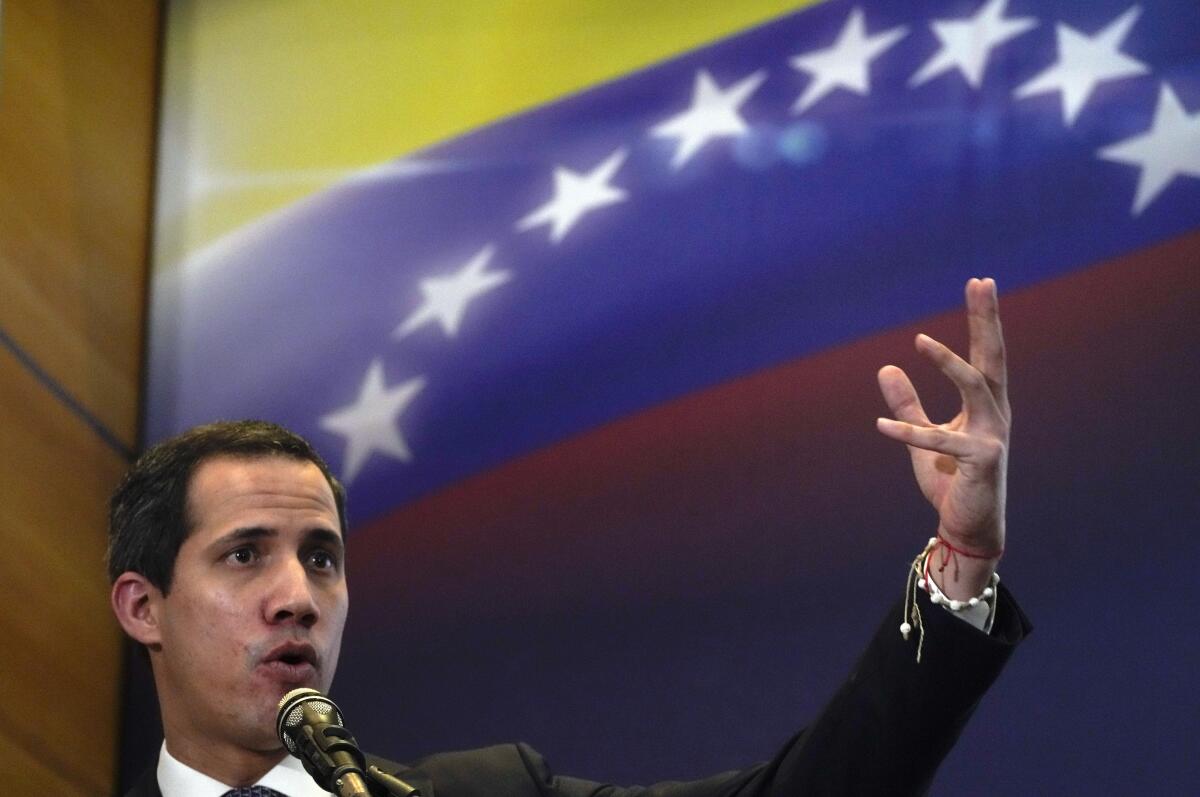Venezuelan opposition strips Juan Guaidó of ‘presidential’ role

- Share via
CARACAS, Venezuela — For three years, Juan Guaidó led the Venezuelan opposition’s efforts to bring about new elections and remove President Nicolás Maduro.
But on Friday, dozens of politicians who once backed Guaidó voted in favor of removing the 39-year-old engineer and replacing his U.S.-supported “interim government” with a committee to oversee presidential primaries this year and protect the nation’s assets abroad.
The vote reflects a changing balance of power within the opposition, which is trying to find new ways to connect with voters ahead of the nation’s 2024 presidential election.
Three of Venezuela’s four main opposition parties backed the proposal to remove Guaidó, who was supported only by his own Popular Will party.
After the vote, Guaidó said the move would create a “power vacuum” that could encourage more foreign nations to recognize the Maduro administration.
“If there is no interim government, who will they recognize in its place?” he said. “Today we have jumped into the abyss. And given up on an important tool in our struggle.”
Guaidó’s opponents said new ways of connecting with voters should be found. The interim government has no sway over local institutions and is unable to provide basic services, with some Venezuelans mocking it as a “fake” government.
“It’s with a heavy heart that I make this vote,” said Luis Silva, a member of the Democratic Action party who participated in the online session for the vote. “We haven’t been able to come up with a unanimous decision, but we need to look for new strategies.”
Daniel Varnagy, a political science professor at Simon Bolivar University in Caracas, said the opposition had generated high expectations under Guaidó’s leadership but failed to keep its promises to people yearning for a change in governance.
“He promised to cease [Maduro’s] usurpation, lead a transition and organize fair elections, and none of that happened,” Varnagy said.
Guaidó rose to leadership of the opposition in 2019 when he was president of the then-opposition-controlled legislature, which had begun its five-year term in 2015 after what many observers considered Venezuela’s last fair elections. It was the last institution not controlled by Maduro’s government.
The National Assembly argued that Maduro won his second presidential term illegally in 2018 because his main rivals were banned from running. So the opposition legislators created an “interim government,” headed by Guaidó, that was meant to last until Maduro stepped down and free elections could be held.
Guaidó organized protests in Venezuela, sneaked out of the country for an international tour and was recognized as the nation’s legitimate leader by the United States and dozens of European and Latin American governments that rejected Maduro’s socialist rule.
His interim administration was also given control of Venezuelan government assets abroad that had been frozen, including Citgo, the Houston-based oil refiner.
But the Guaidó-led opposition failed to win over the Venezuelan military or the nation’s courts to its side, while Maduro’s administration faced down street demonstrations and tightened its grip on the South American nation.
The failure to drive out Maduro frustrated Venezuelans, who are struggling with high inflation, food shortages and the lowest wages in South America — hardships that prodded millions to migrate in recent years.
In a poll taken by Venezuela’s Andres Bello University in November, only 6% of Venezuelans said they would vote for Guaidó if he participated in presidential primaries, while a few other opposition leaders got bigger numbers.
Guaidó’s influence has also diminished since late 2020, when the National Assembly that elected him as interim president was replaced by new legislators chosen in elections boycotted by opposition parties.
Many members of the 2015 National Assembly are now in exile, but they continue to claim to be Venezuela’s legitimate legislative branch and hold online meetings in which they make decisions on issues involving the “interim government.”
On Friday, 72 of the 109 former legislators who participated in the online session voted in favor of a measure calling for replacing Guaidó’s interim administration with a committee made up of other opposition leaders.
More to Read
Sign up for Essential California
The most important California stories and recommendations in your inbox every morning.
You may occasionally receive promotional content from the Los Angeles Times.










